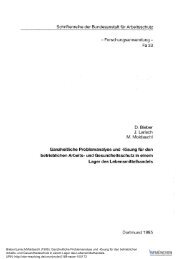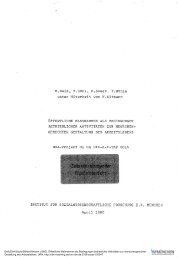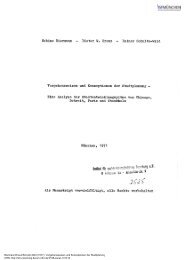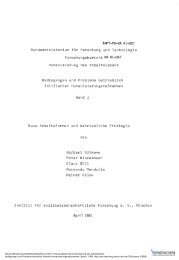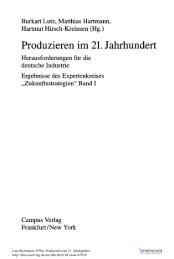- Seite 1 und 2:
Soziologie und gesellschaftliche En
- Seite 3 und 4:
Lutz (1984): Soziologie und gesells
- Seite 5 und 6:
INHALT Vorwort 11 Burkart Lutz PLEN
- Seite 7 und 8:
Bildungsprognosen: Scheitern ohne E
- Seite 9 und 10:
Gewerkschaftliche Technologiepoliti
- Seite 11 und 12:
VORWORT Burkart Lutz Vor einigen Ja
- Seite 13 und 14:
Daß entgegen den ursprünglichen I
- Seite 15 und 16:
Plenarvorträge Lutz (1984): Soziol
- Seite 17 und 18:
ZUR GESELLSCHAFTLICHEN ENTWICKLUNG
- Seite 19 und 20:
drucken konnte. Doch hat sich die N
- Seite 21 und 22: zumeist vor nicht allzu langer Zeit
- Seite 23 und 24: Das soziologische Establishment der
- Seite 25 und 26: liehe und systematische Forschung k
- Seite 27 und 28: DIE GESELLSCHAFTLICHE DYNAMIK ALS T
- Seite 29 und 30: über die kognitiven Probleme hinwe
- Seite 31 und 32: Die Konzentration auf langfristige
- Seite 33 und 34: Für das Verständnis dynamischer V
- Seite 35 und 36: zw. unbeabsichtigter kollektiver Fo
- Seite 37 und 38: gänge auf Strukturen über die Sys
- Seite 39 und 40: um einen zentralen Prozeß oder Zwe
- Seite 41 und 42: deutung sind auch strukturelle Span
- Seite 43 und 44: 21 Richard Louv, America II, J.P. T
- Seite 45 und 46: DIE UNBEKANNTE ZUKUNFT UND DIE KUNS
- Seite 47 und 48: empirische Unerfahrbarkeit seiner Z
- Seite 49 und 50: ihr konkreter Inhalt jeweils einmal
- Seite 51 und 52: Diderots Prognose war der Aufkläru
- Seite 53 und 54: Halten wir als erstes Zwischenergeb
- Seite 55 und 56: in Rechnung stellt. Ihre Struktur i
- Seite 57 und 58: nur rhetorisch wiederholt werden k
- Seite 59 und 60: 8 Brief an Emil Ludwig, zit. nach H
- Seite 61 und 62: This 1 implies that the "mean expec
- Seite 63 und 64: ility and of profit maximization, i
- Seite 65 und 66: a reaction on the part of some econ
- Seite 67 und 68: nature. The Phillips curve aggregat
- Seite 69 und 70: the sense that the future price of
- Seite 71: effective demand as determinant of
- Seite 75 und 76: ton, 1971. F. Frasca, N. Rossi, E.
- Seite 77 und 78: chen finden würde, dann bemerkt ma
- Seite 79 und 80: Die englischen Definitionen erklär
- Seite 81 und 82: Gonzalez beginnt, in der besten Tra
- Seite 83 und 84: Dieses Lesen der Geschichte nimmt d
- Seite 85 und 86: kritische Schwelle ist, wird offens
- Seite 87 und 88: Strukturen unseres Systems eingebau
- Seite 89 und 90: estehende Weltsystem effektiv verä
- Seite 91 und 92: DIE HEUTIGEN GESELLSCHAFTLICHEN SYN
- Seite 93 und 94: ziologen in osteuropäischen Lände
- Seite 95 und 96: sozialistischen Ländern die größ
- Seite 97 und 98: Obwohl ich eine solche Modernisieru
- Seite 99 und 100: den. Für gewisse Teilprobleme werd
- Seite 101 und 102: Themenbereich I: Gesellschaftliche
- Seite 103 und 104: EINLEITUNG Eckart Pankoke Im Erwart
- Seite 105 und 106: aus der Arbeitsgesellschaft", als C
- Seite 107 und 108: politisch geht es dann nicht nur um
- Seite 109 und 110: seilschaftlicher Lebens- und Handlu
- Seite 111 und 112: c) Parallel zur Entwicklung dieses
- Seite 113 und 114: Alles menschliche Handeln ist demna
- Seite 115 und 116: Kind soll nicht 'passieren';"mein K
- Seite 117 und 118: im Spiel, in der Auseinandersetzung
- Seite 119 und 120: einzelner Aspekte betrachten, was z
- Seite 121 und 122: derum das Subjektive, das tatsächl
- Seite 123 und 124:
diere selbstverständlich nicht fü
- Seite 125 und 126:
zuhaben und an seiner Veränderung
- Seite 127 und 128:
Ad-hoc-Veranstaltungen des 22. Deut
- Seite 129 und 130:
samte Debatte. Die Ausweitung von F
- Seite 131 und 132:
genden Wert die leistungsgerechte E
- Seite 133 und 134:
Ehefrau erstreckte sich insofern ni
- Seite 135 und 136:
gesetzestechnischen Bedürfnissen;
- Seite 137 und 138:
werden, während von Arbeitgebersei
- Seite 139 und 140:
wie vor als angemessene Betreuerin
- Seite 141 und 142:
denken? Der Hinweis auf die Notwend
- Seite 143 und 144:
Horkheimer, M., Hg., 1936: Studien
- Seite 145 und 146:
ZUR ENTWICKLUNG LOKALER LEBENSZUSAM
- Seite 147 und 148:
2. Nach den bekannten Arbeiten übe
- Seite 149 und 150:
kontakte sowie den städtebaulichen
- Seite 151 und 152:
Fassbinder, H. (1971): „Kapitalis
- Seite 153 und 154:
Strömungen aufzudecken und zu stru
- Seite 155 und 156:
Stadtsoziologe Pahl wies darauf hin
- Seite 157 und 158:
Das Leben in Städten — so lassen
- Seite 159 und 160:
Pons, V. und R. Francis (eds.), Urb
- Seite 161 und 162:
schäftigungsverhältnis ebenso wie
- Seite 163 und 164:
piert. Umgekehrt: Die gesellschaftl
- Seite 165 und 166:
intendierte Wirkungen der Sozialpol
- Seite 167 und 168:
Widerstände bestehen, sondern weil
- Seite 169 und 170:
MARGINALISIERUNG ALS SOZIALPOLITISC
- Seite 171 und 172:
Sicherheit, das die Erwerbsarbeit z
- Seite 173 und 174:
— Marginalisierung läßt sich im
- Seite 175 und 176:
eitszeit etc.) ebenso beschäftigen
- Seite 177 und 178:
Diskussionsbeiträge zu den Referat
- Seite 179 und 180:
Partnerform der nicht-legalisierten
- Seite 181 und 182:
zu gehen: gesellschaftliche Entwick
- Seite 183 und 184:
soph glaubt, er könne die ganze We
- Seite 185 und 186:
Gegenstand ausmachen. Zu diesen geh
- Seite 187 und 188:
erweiterte und differenzierte Arbei
- Seite 189 und 190:
— Bei einer Analyse des Muttersch
- Seite 191 und 192:
meine Aufgabe darin, zu zeigen, da
- Seite 193 und 194:
fängt — bei einem monatlichen Ei
- Seite 195 und 196:
Begleiteffekten nach der Kritik unt
- Seite 197 und 198:
litisch kalkulierten und kontrollie
- Seite 199 und 200:
Interessen zugrunde liegen und ihre
- Seite 201 und 202:
schäftigten. Ausmaß und Intensit
- Seite 203 und 204:
Die sozialpolitisch dominante Strat
- Seite 205 und 206:
Themenbereich II: Prognosen im Bild
- Seite 207 und 208:
EINLEITUNG Ansgar Weymann Obwohl di
- Seite 209 und 210:
PROGNOSEN ÜBER BILDUNG UND ARBEIT
- Seite 211 und 212:
schon ein paar gewünschte Verände
- Seite 213 und 214:
Während Peisert seine Bewertung de
- Seite 215 und 216:
Qualität im Grunde von der Setzung
- Seite 217 und 218:
nungspotentialen des beruflichen Ei
- Seite 219 und 220:
fende gut voraussagt; nach anderen
- Seite 221 und 222:
siblen und in den Paradigmen der ei
- Seite 223 und 224:
G.E. Ortner (Hrsg.): Die deutsche H
- Seite 225 und 226:
Selbstentfaltungswerten hinzuzurech
- Seite 227 und 228:
Möglichkeit — für die Ergebniss
- Seite 229 und 230:
dann lautet sie dahingehend, daß s
- Seite 231 und 232:
Lohnakkordsystem verbunden ist. Auc
- Seite 233 und 234:
die sich auch auf der Ebene der Wer
- Seite 235 und 236:
zwar durchweg von wertwandlungsrele
- Seite 237 und 238:
Problemfeld nur dann in einer unred
- Seite 239 und 240:
weiter zunehmenden Einflußwirkung
- Seite 241 und 242:
W. Herbert/W. Sommer: „Bildungssy
- Seite 243 und 244:
dessen Verfasser richten, nicht abe
- Seite 245 und 246:
Obwohl Prognosen über Studentenzah
- Seite 247 und 248:
Piazolo beantwortet die Frage nach
- Seite 249 und 250:
schung in der unmittelbaren Beratun
- Seite 251 und 252:
Arbeit herangeführt, nämlich auf
- Seite 253 und 254:
— auf die Überprüfung bzw. Entw
- Seite 255 und 256:
der 70er Jahre auf zur Zeit 434 red
- Seite 257 und 258:
politisch weiterhin für wichtig er
- Seite 259 und 260:
dergleichen systematisch erfaßt un
- Seite 261 und 262:
8 Jahresbericht 1976, Der Bundesmin
- Seite 263 und 264:
der Ausführungen stellen, mit dene
- Seite 265 und 266:
struktur herausgebildet hat. Bei et
- Seite 267 und 268:
strukturellen Konsequenzen, also f
- Seite 269 und 270:
Untersuchungen häufig nur wahr, we
- Seite 271 und 272:
ZUR POLITIKBERATUNG DURCH BILDUNGSF
- Seite 273 und 274:
Wissenschaftler, die sich mit Weite
- Seite 275 und 276:
3. Bedeutung für die Soziologie al
- Seite 277 und 278:
—, Gerl, H.: Lehr- und Lernverhal
- Seite 279 und 280:
— Humanität, Flexibilität, Prod
- Seite 281 und 282:
Die Kommission „Weiterbildung" ha
- Seite 283 und 284:
lichkeiten einzuschränken, setze i
- Seite 285 und 286:
expansion zurückführen. Ich will
- Seite 287 und 288:
gewandelt: Er steht nach wie vor f
- Seite 289 und 290:
ist, wo er am ehesten auf die Verbr
- Seite 291 und 292:
1956 1960 1964 1968 1972 1975 1978
- Seite 293 und 294:
welche Prognosen auf der Grundlage
- Seite 295 und 296:
EXPERIMENTAL—PLÄNE IN SOZIALWISS
- Seite 297 und 298:
planans für beliebig viele Explana
- Seite 299 und 300:
der 'unbelebten' Natur ein akzeptab
- Seite 301 und 302:
indizieren, daß es in diesen Wisse
- Seite 303 und 304:
FRAGEN DER ERKLÄRUNG UND PROGNOSE
- Seite 305 und 306:
(„Sinnadäquanz") dieser Zusammen
- Seite 307 und 308:
qualitativen Studien werden in der
- Seite 309 und 310:
Aussagen vor allem die folgenden Fo
- Seite 311 und 312:
„Herr S.: 'Meine freie Zeit verbr
- Seite 313 und 314:
positivismus. Aber zu fragen ist, o
- Seite 315 und 316:
Bühl, Walter (Hrsg.): Verstehende
- Seite 317 und 318:
Themenbereich III: Terrorismus in d
- Seite 319 und 320:
EINLEITUNG Günter Albrecht Über v
- Seite 321 und 322:
Nur dann, so behaupte ich, wird der
- Seite 323 und 324:
und nicht zuletzt als Schuldfragen
- Seite 325 und 326:
nämlich, daß Gegengewalt überhau
- Seite 327 und 328:
ihnen auch, wie wir wissen, ausdrü
- Seite 329 und 330:
großen Zahl empirischer Fälle, so
- Seite 331 und 332:
über seine eigentlichen Anlässe h
- Seite 333 und 334:
LITERATUR Fetscher, Iring, Herfried
- Seite 335 und 336:
1. Die Suspendierung der natürlich
- Seite 337 und 338:
gen nicht heran", zu der Schlußfol
- Seite 339 und 340:
Ganz offensichtlich geht es hier ni
- Seite 341 und 342:
immer die Wirklichkeit der Zustimmu
- Seite 343 und 344:
entsprach auf der Ebene des Verhalt
- Seite 345 und 346:
Handeln unter Verletzung der Regeln
- Seite 347 und 348:
3. Empirische Probleme der Analyse
- Seite 349 und 350:
Schlußbemerkung Ich bin damit am E
- Seite 351 und 352:
Themenbereich IV: Gesellschaftliche
- Seite 353 und 354:
EINLEITUNG Hartmut Neuendorff, Gert
- Seite 355 und 356:
TECHNOLOGIEENTWICKLUNG ZWISCHEN EIG
- Seite 357 und 358:
— Sie vernachlässigt die überbe
- Seite 359 und 360:
Ein zweiter Schritt gilt der Analys
- Seite 361 und 362:
der „safeguards" und der „inhä
- Seite 363 und 364:
netische, zell- und entwicklungsbio
- Seite 365 und 366:
Sodann läßt sich feststellen, da
- Seite 367 und 368:
Druckerpresse, mechanischen Webstuh
- Seite 369 und 370:
Kurs zu institutionalisieren, strat
- Seite 371 und 372:
verhalte gefaßt wird, deren Sozial
- Seite 373 und 374:
Janshen, D., O. Keck und W.D. Weble
- Seite 375 und 376:
Kommentare zum Beitrag von Joerges,
- Seite 377 und 378:
ung der Wissensproduktion — nicht
- Seite 379 und 380:
Obwohl sich in gewissen Bereichen s
- Seite 381 und 382:
den theoretisch-methodologischen Gr
- Seite 383 und 384:
Manchmal hat man den Eindruck, daß
- Seite 385 und 386:
d) Im Bewußtsein dieser Einschrän
- Seite 387 und 388:
entschieden wird, deren Details nic
- Seite 389 und 390:
Unsere Hauptaussage bedeutet: In de
- Seite 391 und 392:
Daß sich in diesen Branchen die ne
- Seite 393 und 394:
Diese Entwicklungen stellen für di
- Seite 395 und 396:
Dritte Gruppe: Die Arbeiter in den
- Seite 397 und 398:
ANMERKUNG 1 Horst Kern, Michael Sch
- Seite 399 und 400:
gerneinerungsfähigen Modernisierun
- Seite 401 und 402:
ganzheitlichen Aufgabenzuschnitt du
- Seite 403 und 404:
isch und historisch erfahrbarer Wir
- Seite 405 und 406:
Wenn ich auch die Düllschen Einwä
- Seite 407 und 408:
len Kapitals zielt immer darauf, di
- Seite 409 und 410:
tätskonzept als die traditionelle
- Seite 411 und 412:
TECHNOLOGIEENTWICKLUNG: AUTONOMER P
- Seite 413 und 414:
die Idee kommen, für die vorfindli
- Seite 415 und 416:
Für die soziologische Systemtheori
- Seite 417 und 418:
esonderen Werten (Krankheit, Gesund
- Seite 419 und 420:
Es ist heute ein Gemeinplatz, daß
- Seite 421 und 422:
ökonomisierung und Politisierung.
- Seite 423 und 424:
These 4: Der Mechanismus der gesell
- Seite 425 und 426:
Verwertungslogik der Industrie bevo
- Seite 427 und 428:
esser Rechnung tragen soll (Brandt/
- Seite 429 und 430:
dere Art der Verknüpfung verschied
- Seite 431 und 432:
Die Ausdehnung moderner Technologie
- Seite 433 und 434:
Noble, D., 1978: „Social Choice i
- Seite 435 und 436:
Teil I: Rahmenbedingungen zukünfti
- Seite 437 und 438:
indem sie nur indirekte, zeitlich v
- Seite 439 und 440:
1. dem Charakter betrieblicher Einf
- Seite 441 und 442:
(3) Diesem Beharrungsvermögen des
- Seite 443 und 444:
— Die wichtigste diesbezüghche V
- Seite 445 und 446:
die arbeitsvorbereitenden, -begleit
- Seite 447 und 448:
LITERATUR Dörr/Hildebrandt/Seltz,
- Seite 449 und 450:
Themenbereich V: Theorien der gesel
- Seite 451 und 452:
EINLEITUNG Bernhard Giesen Das Them
- Seite 453 und 454:
WEGE DER MODERNE. ZWISCHEN TRADITIO
- Seite 455 und 456:
2. Amerika: Zwischen Universalismus
- Seite 457 und 458:
Mit dem innerweltlichen Mystizismus
- Seite 459 und 460:
nichts zu tun hatte. Es waren diese
- Seite 461 und 462:
Max Webers Aussagen über die Entwi
- Seite 463 und 464:
VERSOZIALWISSENSCHAFTLICHUNG DER ID
- Seite 465 und 466:
Normalitätsentwürfe für Persönl
- Seite 467 und 468:
der Primat der lebenspraktischen Er
- Seite 469 und 470:
In dem Maße, in dem in den italien
- Seite 471 und 472:
lemdruck zurückführen. Nicht Bequ
- Seite 473 und 474:
len Dialektik von Entscheidungs- un
- Seite 475 und 476:
BEMERKUNGEN ZU GESELLSCHAFTSSTRUKTU
- Seite 477 und 478:
Die sozialstrukturellen Determinant
- Seite 479 und 480:
in solchen Gesellschaften eingeengt
- Seite 481 und 482:
druck zuerst der durchzusetzenden,
- Seite 483 und 484:
waren für gewöhnlich durch sozusa
- Seite 485 und 486:
DER KAPITALISMUS - EIN UNVOLLENDBAR
- Seite 487 und 488:
nicht die Besonderheiten von Schump
- Seite 489 und 490:
Gesellschaften der Fall war. Die Wi
- Seite 491 und 492:
ei Schumpeter vorgebildet ist, daß
- Seite 493 und 494:
chen Bearbeitungsformen dieses Zent
- Seite 495 und 496:
Grund für die Funktionsfähigkeit
- Seite 497 und 498:
MOBILISIERUNG DER LAIEN - DEPROFESS
- Seite 499 und 500:
6. Die Machtbalance zwischen Staat
- Seite 501 und 502:
Professionen in der gesellschaftlic
- Seite 503 und 504:
otsunabhängigen Kriterien bestehen
- Seite 505 und 506:
Pluralistisches Machtgleichgewicht
- Seite 507 und 508:
der Wissensverteilung (Austausch si
- Seite 509 und 510:
MÄRKTE, KÄUFLICHKEIT UND MORALÖK
- Seite 511 und 512:
Es sind nicht Gaben, um deretwillen
- Seite 513 und 514:
schiedlich, sondern haben auch unte
- Seite 515 und 516:
wurden, keine Stabilität durch Sub
- Seite 517 und 518:
zellen abgeschottet ist oder stark
- Seite 519 und 520:
5 Besser als in einem alten Arbeits
- Seite 521 und 522:
Klassencharakter des entstehenden N
- Seite 523 und 524:
FORMALE RATIONALITÄT ALS KERN DER
- Seite 525 und 526:
stizierbarkeit, maschinenmäßigem
- Seite 527 und 528:
dellen, solange man sich stets gege
- Seite 529 und 530:
Abschließend ein letzter Hinweis:
- Seite 531 und 532:
Ich nenne diese zusammenhängenden
- Seite 533 und 534:
70 bis 90 % bei Meinungsumfragen. N
- Seite 535 und 536:
ten — schreckliche Konzepte zu of
- Seite 537 und 538:
DIE MODERNISIERUNG DER ZEIT UND DIE
- Seite 539 und 540:
diesen Befund, der für das frühe
- Seite 541 und 542:
kult, sondern auch: Vermeidung von
- Seite 543 und 544:
DIE ZÖGERNDE BEGRÜSSUNG DER MODER
- Seite 545 und 546:
ten" entschädigt (Simmel 1900, S.
- Seite 547 und 548:
Produktion und die „laute ... Pra
- Seite 549 und 550:
Wissen - Orientierung - Handlung* S
- Seite 551 und 552:
stützen kann. Interessante Untersu
- Seite 553 und 554:
daß sich dies allgemein formuliere
- Seite 555 und 556:
in der christlichen Gemeinde, d.h.
- Seite 557 und 558:
darin, die Zugehörigkeit zur neuen
- Seite 559 und 560:
SOZIALE UND BIOGRAPHISCHE KONSTITUT
- Seite 561 und 562:
keine scharf getrennten Merkmalskla
- Seite 563 und 564:
estätigt wird), daß die ,,Selbsth
- Seite 565 und 566:
Zum einen versuchen solche Patiente
- Seite 567 und 568:
iisch Kranken" ist stark, wenn auch
- Seite 569 und 570:
7 vgl. W. Fischer, „Alltagszeit u
- Seite 571 und 572:
ökonomischer Motor, sondern ebenso
- Seite 573 und 574:
samten Einwohner und das Vieh eines
- Seite 575 und 576:
kratisch geregelt. Wie funktioniert
- Seite 577 und 578:
Allgemein betrachtet, gab es zumind
- Seite 579 und 580:
Klassenbildung: Die vielen Autoren
- Seite 581 und 582:
Indizien für eine verfallende Hege
- Seite 583 und 584:
vielmehr sollte mit untauglichen Mi
- Seite 585 und 586:
(zusammen mit N. Altmann, P. Binkel
- Seite 587 und 588:
für Sozialpsychologie an der Unive
- Seite 589 und 590:
Friedhelm Neidhardt, Prof., Forschu
- Seite 591:
schulexpansion und Bedarf der Gesel





